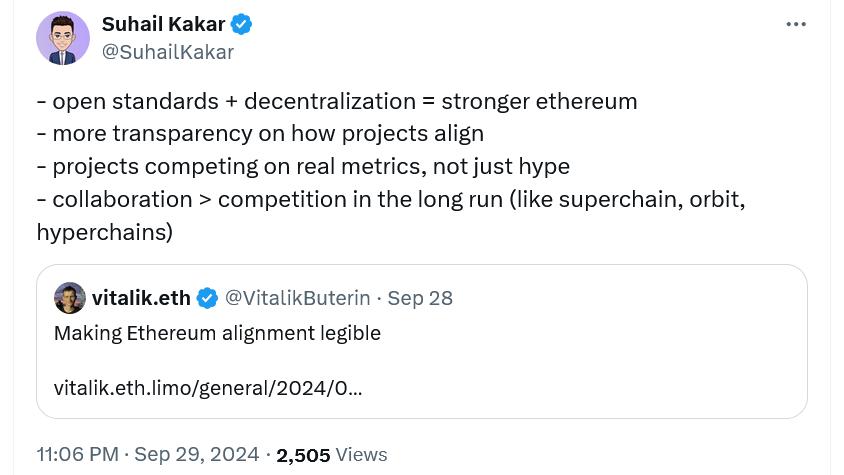Ethereum co-founder Vitalik Buterin highlighted the need for metrics to assess how new projects align with Ethereum’s core values.

One of Ethereum’s cofounders, Vitalik Buterin, has suggested developing a set of metrics to measure how closely new projects adhere to Ethereum’s core values.
Buterin indicated that obtaining “Ethereum alignment” continues to be one of the most significant social issues in the Ethereum ecosystem in his most recent blog post, which was published on September 28.
However, Vitalik Buterin noted that it is a challenging undertaking due to the enormous number of client teams, application developers, researchers and local communities, all of which are attempting to contribute to Ethereum in their own individual ways:
“The primary challenge is making sure that all these projects are, collectively, building something that feels like one Ethereum ecosystem, and not 138 incompatible fiefdoms.”
However, Vitalik Buterin stated that there are already a number of “starting points,” such as the degree to which a project is open source. As he explained, open source not only allows for code inspection to ensure its safety, but it also lessens the likelihood of being locked into a proprietary system and gives third parties the opportunity to add enhancements.
Another factor to consider is the degree to which a project is compatible with other projects. Vitalik Buterin suggests grade applications and wallets based on their compatibility with ERCs. Meanwhile, you can evaluate decentralization and security using the “walkaway” and “insider attack” tests.
“If your team and servers disappear tomorrow, will your application still be usable?”
He made the following explanation: “If your team itself tries to attack the system, how much will break, and how much harm could you do?” He further stated that a project’s evaluation could also consider its benefits to the Ethereum community or to humanity in general.

For instance, we could evaluate it based on its ability to enhance financial inclusion and create new public funding channels. In July, Ryan Berckmans, a member of the Ethereum community, spoke about the importance of limiting marketing for Ethereum developers.
“While it’s literally good for growth, it ends up turning your chain and community into a politically charged partnership swamp, and that will prevent the serious growth down the line where corporations and governments start relying on onchain for very important and large activities.”
He emphasized that this may potentially create an atmosphere in which winners and losers emerge. In the Ethereum ecosystem, Buterin is himself a voice that carries a great deal of responsibility.
Charles Hoskinson, the founder of Cardano, observed that cryptocurrency Ethereum might be placing an excessive amount of reliance on Buterin for guidance. He is the one everyone turns to for the route map. According to Hoskinson, “Everyone looks to him for inspiration, and he is also the only person who has enough power to rally people”.
“If you were to remove him from the equation right now, what’s the next hard fork going to look like, and how quickly can they actually get there?”
